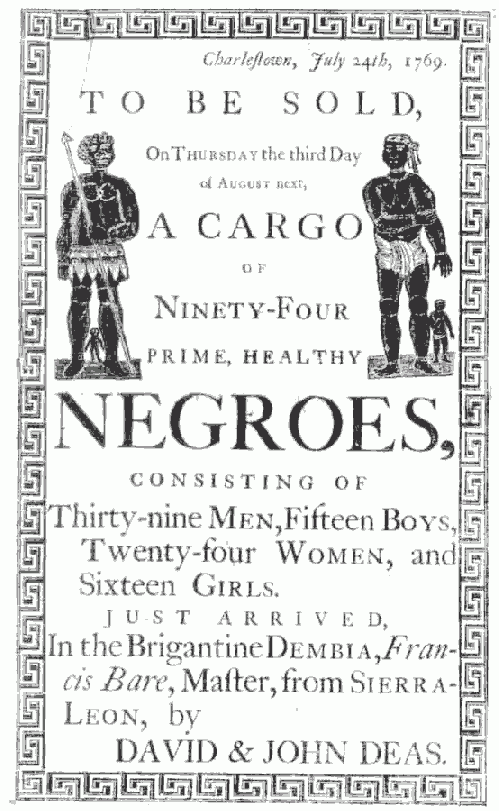Africans auctioned off like property
Slave
Auction Poster 1769: "To be sold, a cargo of ninety-for prime, healthy
negroes, consisting of thirty-nine men, fifteen boys, twenty-four women
and sixteen girls. Just arrived... from Sierra-Leon."
Racial discrimination in America did not end with slavery. Racism is institutionalized and multi-layered. Contributions by the enslaved Africans to the building of America may have begun with the farm skills of the enslaved, but another contribution that is virtually unknown is that blacks were part of the original contingent of cow herders/cowboys who shaped the west.
"No less than twenty-five percent of all cowhands were Black. In fact, the label � ���"cowboy� �� � is thought to have originally been a derogatory term used to describe Black � ���"cowhands� �� �. As the word � ���"cowboy� �� � has grown immeasurably in popularity, the Black cowboys the term described have been stricken from the record with extreme prejudice."
Blacks forced out of the sport of horseracing
Although sports participation by blacks is more egalatarian nowadays� ��"sports was one of many arenas where blacks were excluded and discriminated against. One striking example of exclusion and racism that consequently still exists today--is the exclusion of blacks from the sport of horse-racing. When horse-racing was America's first national sport� ��"black jockeys dominated. Arthur Ashe wrote about this in his book ''A Hard Road to Glory: A History of the African- American Athlete.'' It's an unfortunate fact that Blacks were forced out of horseracing because of the color of their skin.
"For 120 years, white America has gone to extraordinary lengths to discredit and discourage black participation in sports because black athletes have been so accomplished. The saddest case is that of the black jockeys. When the first Kentucky Derby was run in 1875, 15 thoroughbreds were entered and 14 of their riders were black. Black domination of horse racing then was analogous to the domination of the National Basketball Association today. Subsequently, the Jockey Club was formed in the early 1890's to regulate and license all jockeys. Then one by one the blacks were denied their license renewals. By 1911 they had all but disappeared."
After slavery ends, Black inventors enjoy a renaissance
This country also owes much to a multitude of black inventors whose inventions and contributions have spawned many industries--from Lewis Latimer to Garrett Morgan.
Lewis Latimer came up with the substance used in the filament of Edison's successful version of the Incandescent Light Bulb. Latimer's carbon filter made the light bulb stay lit a lot longer. Edison's original filament of bamboo, burned out after only 30 hours. Latimer patented his invention in 1882. Latimer also co-authored the first text book on electricity published in 1890 called, "Incandescent Electric Lighting: A Practical Description of the Edison System." He was the son of George and Rebecca Latimer, escaped slaves from Virginia.Garrett Morgan, who was also the son of a former slave, invented the
traffic light. Morgan received his United States patent on November 20,
1923 and he also patented his invention in Great Britain and Canada.
Black politics after the Civil War
(Note: You can view every article as one long page if you sign up as an Advocate Member, or higher).






